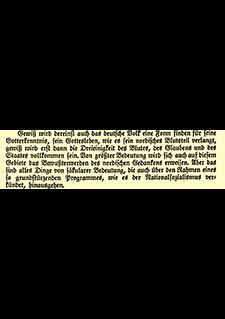Völkish Religiosity and Christianity
Some leading National Socialists followed a völkisch religiosity like that already firmly established in organizations such as the “German Church League” in 1921 and the “Tannenbergbund” in 1925. Hitler’s thinking also drew from this diffuse völkisch religiosity in which providence and the notion of election played an important role.
Hitler reined in the proponents of “neopagan völkisch religiosity” within the NSDAP so as not to come into conflict with the churches. Arthur Dinter, propagator of a so-called spiritualistic Christian religious community, was expelled from the party in 1928 after lengthy conflicts.
According to point 24 of its 1920 platform, the Party espoused a positive Christianity. Nonetheless religious freedom ought to be constrained by the traditional and moral sensitivities of the Germanic race.
Gottfried Feder, the author of the authoritative of commentary on the party platform, interpreted the concept of “positive Christianity” in the sense of völkisch religiosity. This interpretation had to be deleted in 1931 on Hitler’s instruction because, from 1930 onward, Hitler demonstrated a stance favorable to the church intended to win votes in the national Protestant camp and to circumvent the Catholic church’s statements of dissociation.
Source / title
- © Bayerische Staatsbibliothek

